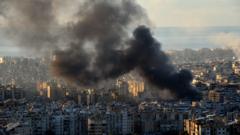Israeli Prime Minister Benjamin Netanyahu has urged his ministers to endorse a ceasefire agreement aimed at de-escalating the ongoing conflict with Hezbollah in Lebanon. In a broadcasted address, he asserted that Israel would retaliate decisively to any breaches of the ceasefire. Since October 2023, the Iran-aligned group has been engaged in regular cross-border skirmishes with Israel, intensifying since late September due to increased Israeli airstrikes and a limited ground incursion.
The conflict has resulted in Lebanon's most devastating toll in decades, claiming over 3,823 lives according to local statistics. Netanyahu specified that the duration of the ceasefire would depend on Hezbollah's compliance. He emphasized Israel's commitment to maintaining pressure on Hamas in Gaza, positing that neutralizing Hezbollah would facilitate a more focused strategy against the group, which he regards as a significant Iranian threat.
In a twist of historical ties, France, which administered Lebanon for over 20 years, is likely to oversee the ceasefire monitoring. According to reports from CBS, a ceasefire period of 60 days is expected to commence, prompting both parties to withdraw their forces from southern Lebanon, specifically south of the Litani River, a notable boundary established post the 2006 conflict.
Despite the announcement of the truce, recent Israeli airstrikes on Beirut have resulted in civilian casualties, highlighting the fragile nature of the situation. The Israeli Defense Forces (IDF) have intensified their operations against Hezbollah, a group many Western nations classify as a terrorist organization, in response to cross-border threats that began with the war in Gaza.
The humanitarian stakes are dire; the war has brought catastrophic consequences to Lebanon, with a reported one million residents displaced and economic damages estimated at $8.5 billion by the World Bank. Recovery from the devastation faces uncertainty, compounded by the question of who will finance the rebuilding efforts.
Hezbollah has also suffered heavy losses, losing key leadership figures and sustaining extensive damage to its infrastructure. While its influence may be curtailed, the group retains a political role in Lebanese society and significant support from the Shia community. Critics anticipate this moment could present opportunities to diminish Hezbollah's power, fearing potential internal conflict as Lebanon grapples with the aftermath of the conflict. The future landscape for Hezbollah and Lebanese civil stability remains uncertain amidst the lingering effects of warfare.



















